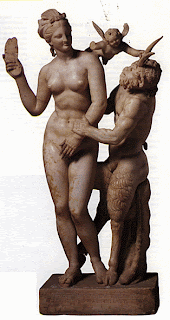This word has nothing to do with pugilism, as I mistakenly thought. Quite the opposite, in fact. It's an adjective that means cowardly, faint hearted and weak spirited. It's earliest recorded use was from before 1425 (spelt without the 'o') and came directly from the Latin pusillanumus/pusillanimis, which meant having very little courage. It was a merging of the Latin for little, pusillus, and the Latin for spirit or courage, animus. The spelling that we know first appeared in 1586, but sadly the word is rarely seen in literature anymore.
Allow me to leave you with a quote from a classic. In the film The Wizard of Oz, the Wizard says to the Scarecrow, "Why anybody can have a brain. That's a very mediocre commodity. Every pusillanimous creature that crawls on the earth or slinks through slimy seas has a brain."
Sources:
Chambers 21st Century Dictionary (1996), Chambers.
The Wizard of Oz [online], www.imdb.com/title/tt0032138 (Accessed 10 February 2012).
Images:
The Wizard of Oz (1939), Warner Brothers.
Juliana
A blog about words. Old words, strange words, nonexistent words, place names, people's names and words that we just like.
Friday 17 February 2012
Sunday 12 February 2012
Panic
I have been given a task by a couple of my regular library borrowers: to find a stronger word than panic. It has a few subtly different meanings and is both a noun and an adjective, but usually has the sense of unreasoning fear. In 1627, it was a contagious emotion that was induced by the god Pan. The meaning that we know today first appeared in 1708.
From 1603, panic was also used as an adjective, for example panic fear or panic horror which came from the Greek Panikos. Pan was the Greek god who, when not dancing or amorously pursuing nymphs, caused an irrational 'panic' fear in men and cattle that dared trespass in his forests. The image on the right is a Greek statue from 100 BC that shows Pan pestering Aphrodite, note her shoe in her hand that she is about to use to swat him away.
Unfortunately, I've failed in my task. I couldn't find anything stronger than panic. According to the Bloomsbury Theasaurus, there are many possible synonyms, such as dread, terror, horror, distress and alarm, but none convey the same strength of emotion.
Sources:
Alexander, Fran (ed.) (1994) Bloomsbury Thesaurus, Bloomsbury.
From 1603, panic was also used as an adjective, for example panic fear or panic horror which came from the Greek Panikos. Pan was the Greek god who, when not dancing or amorously pursuing nymphs, caused an irrational 'panic' fear in men and cattle that dared trespass in his forests. The image on the right is a Greek statue from 100 BC that shows Pan pestering Aphrodite, note her shoe in her hand that she is about to use to swat him away.
Unfortunately, I've failed in my task. I couldn't find anything stronger than panic. According to the Bloomsbury Theasaurus, there are many possible synonyms, such as dread, terror, horror, distress and alarm, but none convey the same strength of emotion.
Sources:
Alexander, Fran (ed.) (1994) Bloomsbury Thesaurus, Bloomsbury.
Chambers Dictionary of Etymology (1988), Chambers.
Clayton, Peter et al. (1990) A-Z of Mythology, Bison Books.
Hodge, Jessica (1995) Who's Who in Classical Mythology, Bison Books.
Images:
Aphrodite, Pan and Eros (c.100 BC) [online], http://lib.haifa.ac.il/collections/art/gr/aphrodite_pan_and_eros_100.gif (Accessed 12 February 2012)
Juliana
Thursday 12 January 2012
Esurient
It's not often that I come across a new word (forgive me if this sounds like bragging, but it is more to do with my choice of reading material rather than my 'extensive' vocabulary), so when I do find a new word it's like coming across an antique at a car boot sale.
The word I learnt yesterday was esurient, found on page 103 in Kevin Hearne's novel 'Hounded' (published by Orbit in 2011): "I felt completely restored, albeit dreadfully thirsty and a bit esurient".
Esurient is an archiac expression that means hungry (appropriately used in the novel as the character is an immortal Druid) and comes from the Latin esurire and esuriens, to hunger. It's so archiac, that the word does not appear in many dictionaries. I had quite a hunt to find it's meaning.
So, amaze your friends and family. Next time someone asks you, "Are you hungry?", you can reply "Yes, I'm quite esurient", and watch their faces as they try to work out what you just said...
Sources:
The Concise Oxford Dicitonary of Current English (1995), Clarendon Press.
Hearne, Kevin (2011) Hounded, Orbit.
Juliana
The word I learnt yesterday was esurient, found on page 103 in Kevin Hearne's novel 'Hounded' (published by Orbit in 2011): "I felt completely restored, albeit dreadfully thirsty and a bit esurient".
Esurient is an archiac expression that means hungry (appropriately used in the novel as the character is an immortal Druid) and comes from the Latin esurire and esuriens, to hunger. It's so archiac, that the word does not appear in many dictionaries. I had quite a hunt to find it's meaning.
So, amaze your friends and family. Next time someone asks you, "Are you hungry?", you can reply "Yes, I'm quite esurient", and watch their faces as they try to work out what you just said...
Sources:
The Concise Oxford Dicitonary of Current English (1995), Clarendon Press.
Hearne, Kevin (2011) Hounded, Orbit.
Juliana
Subscribe to:
Posts (Atom)

